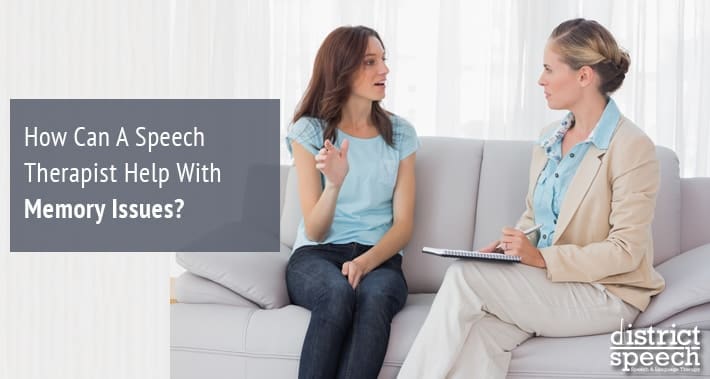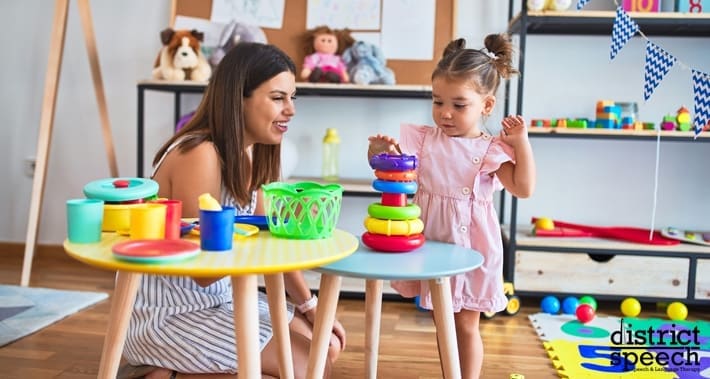
Your memory is important for your everyday life in ways you might not even realize.
Of course, your memory keeps facts in your brain, like your next meeting, if you’re picking the kids up from school on Wednesday, or who the president was in 1979.
(it was Jimmy Carter, by the way)
It also helps you remember how to do things, like type on your keyboard or brush your teeth.
Even knowing everything your memory does for you, it might surprise you that attending a speech therapy clinic can help with your memory problems.
Because speech and memory are tied so closely together, your speech therapist is an excellent person to go to if you or your child are experiencing memory problems.
What Actually Is Memory?
Simply put, memory is your ability to recall information that you’ve previously encountered.
Your memory is important for learning because it lets you draw upon information you’ve learned.
Your memory also allows you to recall this information in a timely manner.
What Is Working Memory?
Working memory is one type of memory that everyone has.
Your working memory lets you hear information, interpret it, understand it, and then use it to complete a task.
You use your working memory when completing simple mental math.
For example, if someone asks you what six plus six is, you use your working memory to listen to what they’re saying, interpret the math problem, calculate, and answer.
What Is Word Retrieval?
When you think of a specific word at the time you need it, that’s word retrieval.
You’ve probably experienced the feeling of being stuck when trying to come up with a word.
You remember the meaning of the word and you know it’s the appropriate time to use it, but it’s like the word is on the tip of your tongue.
How Does Language And Memory Develop?
You don’t only use your working memory when you’re doing math.
Working memory is also important for language use and development.
When you’re having a conversation with someone, you’re using your working memory to listen to what they’re saying, extract meaning from the words, store that meaning, and respond.
When someone talks to you, you have to remember what they’re saying and keep that information in your head long enough to act on it.
To do this, your brain doesn’t only listen to the words someone is speaking.
You also need to use your working memory to interpret the individual speech sounds you hear and turn them into words with meaning.
RELATED: Speech Therapy Treatments For Speech Sound Disorders
If your child struggles with their working memory, their language skills may also suffer as a result.
It may be more challenging for them to learn new speech and language skills because their brain can’t remember the things they’ve learned.
Even if they can remember what they’ve learned, it still may be hard for them to actively put that all together when speaking.
You may also notice that your child struggles with their attention skills or has poor behavior.
Helping your child to improve their memory can also help them speak more efficiently and confidently.

How Can Speech Therapy For Kids With Poor Memory Help?
Speech therapy can go a long way for poor memory, both for improving speech skills and simply for improving memory in general.
Your child’s speech therapist will engage your child in games and activities that help their memory with speech and language.
Storytelling games are often useful, as well as games like Broken Telephone or Simon Says, because they all require your child to use their memory.
Your child’s speech therapist will come up with a customized treatment plan for them, including games, to help them work on their memory and speech.
How Can Speech Therapy For Adults With Poor Memory Help?
Adults can also have trouble with their memory that may lead to speech issues.
Usually, this is memory loss that is acquired from something like a traumatic brain injury, degenerative disease, or stroke.
RELATED: How To Recognize When Somebody Is Having A Stroke
If you’ve experienced memory loss as an adult, there are usually a few different aspects of language you might struggle with.
Often, adults with memory loss struggle to understand grammar, word formation, and certain meanings of words.
If you’re an adult with poor memory, you may also struggle with the prosody of your speech, which refers to the rhythm of your speech.
Adults with memory loss can also experience anxiety, isolation, and loss of dignity.
Improving language skills is one way to help with some of these feelings.
If you are an adult with memory loss, your adult speech therapist will be able to create activities that stimulate the parts of your brain involved in speech and memory.
Your speech therapist can help you improve speech and communication skills to improve your quality of life.
Book Your Appointment With District Speech Today
Whether you have a child who struggles with their memory, or you’re an adult who has experienced memory loss, the feeling can be isolating.
Our qualified speech therapists can help improve your memory and aid in speech no matter your age.
Book your appointment with District Speech today.
1300 I St NW, Suite 400 E,
Washington, DC 20005
- https://g.page/districtspeech
District Speech and Language Therapy specializes in speech therapy, physical therapy, and occupational therapy solutions, for both children and adults, in the Washington D.C and the Arlington Virginia areas.